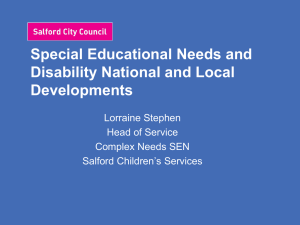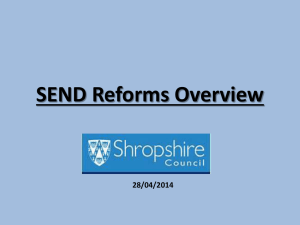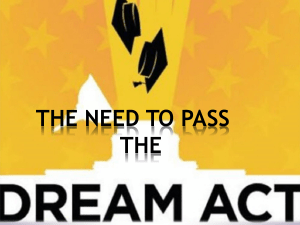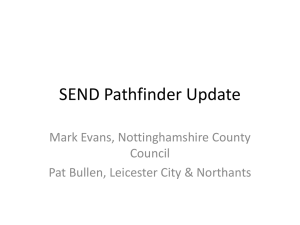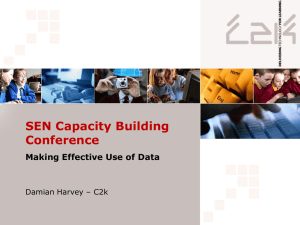Inclusion Workshop Nov 2014
advertisement
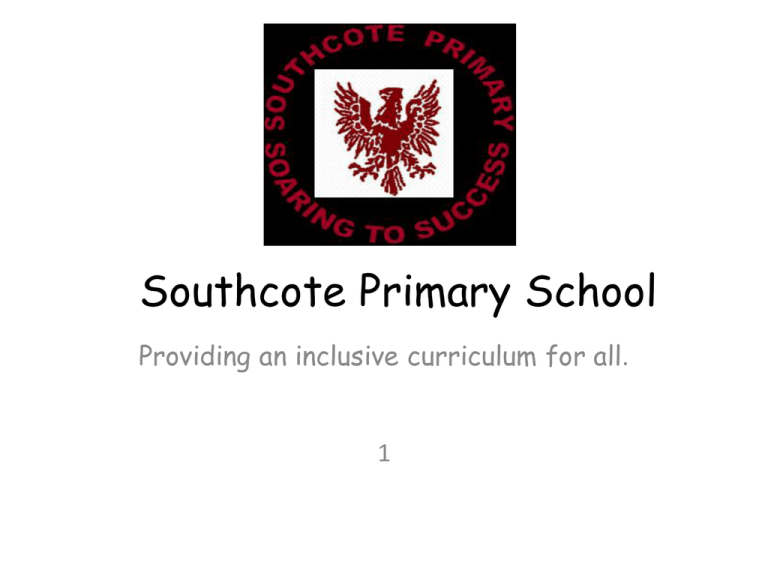
Southcote Primary School Providing an inclusive curriculum for all. 1 What is an inclusive education? • Provides individualised education for all no matter of ability • Caters for all needs from SEN to G&T How do we provide an inclusive education? 1. Ongoing teacher assessment throughout the year 2. Pin pointing child’s individual learning needs 3. Planning to ensure all needs catered for:• Weekly AfL to enable learning to begin from where pupils are at • Plans annotated to show how SEN children and G&T children receive support and extension How do we find those children with additional needs? • Additional needs includes SEN pupils (Special Educational Needs) & A, G&T children (Able, Gifted & Talented) • Termly assessment results inform children’s progress • Look at tracking grids to identify SEN & A, G&T Identifying SEN at Southcote • A clear approach of identifying and responding to SEN. • “A pupil has SEN where their learning difficulty or disability calls for special educational provision, namely provision different from or additional to that normally available to pupils of the same age. “ (SEN Code of Practice.) • Our termly tracking allows class teachers, supported by Senior Leaders to regularly assess progress of all pupils in their class. Identifying SEN at Southcote • These meetings identify pupils who are making less than expected progress given their age and individual circumstances. • This can be characterised by progress which:• -is significantly slower than that of their peers starting from the same baseline • -fails to match or better the child’s previous rate of progress • - fails to close the attainment gap between the child and their peers • -widens the attainment gap • It can include progress in areas other than attainment e.g. where a pupil needs to make additional progress wider development or social needs in order to make a successful transition to adult life. Identifying SEN at Southcote • First response to such progress is high quality teaching targeted at areas of weakness. • If progress then continues to be less than expected the class teacher working with SENCO assess for SEN. • Extra teaching or interventions then put in place. Identifying SEN at Southcote • Slow progress and low attainment do not necessarily mean that a child has SEN. • Also attainment in line with chronological age should not assume that there is no learning difficulty or disability. SEN provision for Cognition & Learning • Good Wave 1 teaching Support within lesson – differentiated work to assist children (scaffolded help to allow them to progress at their rate) • Wave 2 intervention (SEN support children)– in class support, catch up programmes e.g. Numicon, Precision teaching. • Every class has morning intervention with TA • SEN support & EHCP (Education, Health Care Planreplacing Statemented) children help from outside agencies e.g. Educational Psychologists SEN support • SEN support replacing School Action and School Action Plus children. • Graduated approach to SEN • Outside agencies may be involved • Boxall profile conducted which identifies pupils needs • Children placed in suitable intervention groups • Individual Education Plans may be written addressing particular needs (these are not statutory) • IEP’s monitored regularly targets changed EHCP (Statemented) Children Wave 3- If more support needed e.g. 1:1 apply for Statutory Assessment which may result in Child receiving a EHCP for particular need. Cognition & Learning needs • Moderate Learning difficulties - MLD • Severe learning difficulties- SLD • Profound and multiple learning difficulties- PMLD • Specific learning difficulties (SpLD), affect one or more specific aspects of learning. E.g. dyslexia, dyscalculia and dyspraxia) Educational Psychologists, OT Communication & Interaction • Speech, language and communication needs-SLCN, • ASD, including Asperger’s syndrome and Autism included )- Speech & Language, ASD advisory teachers. • Social, Emotional and mental health difficulties • Withdrawn or isolated • Disruptive and disturbing behaviour • Attention deficit disorder, attention deficit hyperactive disorder or attachment disorder Behavioural Support (PSP’s) Emotional Well Being Development Officer Social Skills Play therapist Sensory & Physical • Vision impairment(V) • Hearing impairment (HI) • Multi sensory impairment (MSI) • Physical disability (PD) Occupational Therapy, Massage therapy SEN support in Southcote Assess• identify needs, analysis of needs • Regularly review assessment to ensure support and intervention matches needs. • Outside agencies can inform assessment. • Plan • Do • Review SEN Support at Southcote • Plan • Intervention and support put in place, expected impact on progress, development or behaviour and clear review date set. • Support recorded. • Where appropriate parental involvement to reinforce or contribute to progress. SEN Support at Southcote • Do • Class teacher remains responsible for working with the child. • Group or one–to-one interventions away from main class still responsibility of the teacher. • SENCO support, problem solve and advise on effective implementation of support. SEN Support at Southcote • Review • Reviewed with agreed date – usually termly. • Impact and quality of support evaluated. • The latter feed back into analysis of needs. • Support revised with SENCO and class teacher. • If child has EHCP the local authority reviews it every twelve months. Nurture Group • New in September 2013 • Miss Hodges, Miss How, Mrs Stansfield and Mrs Elliott all received Nurture group training in how to set up and run a nurture group. • Appropriate children chosen to create a small, mixed year group unit, addressing complex needs. • Bespoke unit created in an area in school • Children spend the morning in a ‘family’ within nurture and receive their Literacy and Numeracy teaching with a 1:3 adult ratio. • Learning focuses on key recommendations from professionals. • It is hoped that children will progress and will then be able to return to their classes for Literacy and Numeracy at the end of the intervention. A, G & T Children 1. • • • • Maths Small weekly groups Project based on Using & Applying From years 3-6 Targeted intervention within setting in maths classes 2. • • 3. • PE Monitoring during lessons Recommendation to join clubs in and out of school Literacy targeted group work for higher ability children 4. • • Outside School Talents Three times a year G&T assemblies Celebrate children’s achievements outside school Other Interventions We also provide: • Numicon( a visual maths programme, either as a withdrawal group or within the class maths) • Fine Motor skills • Movement groups • Speech & Language • Circle of friends groups • Social skills groups • Dyslexia groups • Massage therapy • ELSA (Emotional Literacy Support Assistant) support • Play therapy • Attention Development Group • Nurture group • Sensory circuits • Bespoke programmes from Educational Psychologists delivered to selected children Information for Parents • Audit to be sent out soon of requests for workshops that parents would like run by professionals.

